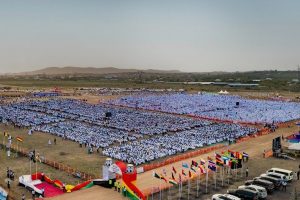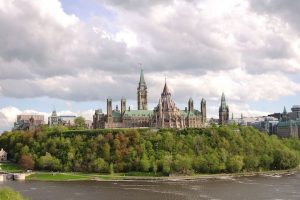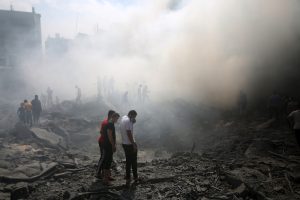
By Mansoor Ahmad Clarke
‘Friday afternoon demonstrated both the very best of humanity and the very worst,’ wrote the Mayor of London, Sadiq Khan, in his recent article for the Guardian,(30/11/19) referring to the horrific attack that took place on London Bridge, on 29/11/19, that laid claim to two innocent lives.
I was standing in the bitter cold, directing cars along with a group of volunteers, when I first heard news of the attack. I, along with a group of friends and colleagues, was at the Cheque Presentation Ceremony of the Mercy for Mankind Charity Challenge, run by the Ahmadiyya Muslim Youth Association (AMYA).
Holding my phone in my gloved hands, I thought to myself, ‘Not again. I hope no one died. I hope he’s not Muslim’. But just moments later, the notification on my phone confirmed my fears – a 28-year-old man, Muslim by name, had just murdered two innocent people in cold blood.
The tube ride along the Northern Line was eerie on Saturday morning. Myself and two other young imams made our way to London Bridge to offer our sympathies and condolences. As we travelled, the increased number of police officers was noticeable and of course the sideways glances from other commuters at our topis (Muslim prayer hats) could not be ignored.

I propped the bouquet of fresh, red roses up against the cold concrete wall in honour of Jack and Saskia and led a short silent prayer. As I did, I could hear the cameras clicking away and sensed the reporters readying their mics to hear what ‘the Muslims’ had to say.
I stood, answering their questions, but while I was thankful for the opportunity to express my heartfelt condolences as well as to deconstruct some negative stereotypes about Islam, I heard one particular question which took me right back to the car park, from the night before.
‘As an Imam what do you think the Muslim community should do to better its image?’ I must admit, upon hearing this I was quite taken aback. I understood what the interviewer meant, but the somewhat careless connection between one individual’s actions to the image and character of almost 2 billion people was one that I had heard all too many times before.
I was hurt, because it seemed almost as if I had come not just to express my condolences and condemnation as anyone else would, but that there was also an expectation for me to apologise and to promise to try harder instead – as if I was somehow responsible.

In reality, this attack was absolutely contradictory to the peaceful and loving teachings of Islam, which declare the killing of one innocent akin to the killing of the whole of mankind. The founder of Islam, The Holy Prophet Muhammad (peace and blessing of God be upon him) also instructed that ‘A Muslim is he from whose hand and mouth all others are safe’ (Bukhari). With these clear-cut teachings in mind, how could anyone ever deem such a crime and attack as being in the name of Islam, or hold the religion of Islam responsible?
It was at the point of being asked the question, that I had an immediate and ardent desire for the world to know about AMYA, or ‘Britain’s best kept secret’ as one person once called it and about what had happened just a few hours earlier at the headquarters of the Ahmadiyya Muslim Community.
As the Mayor of London said, we saw ‘the best and the worst’ on Friday night, but where he was referring specifically to the goings on at London Bridge, Friday night also saw the tireless efforts and endeavours of young Ahmadi Muslims across Britain.
Members of AMYA raised almost a million pounds for British charities, not because of big budgets or millionaire endorsements, but through continuous dedication and arduous efforts of loyalty and diligence.
As guests sat and heard about how AMYA had planted trees, donated to blood drives, cleaned the streets, fed the homeless, visited the elderly, clothed the needy, all free of charge, one guest remarked ‘it is just such a shame that none of this will ever make the news’.

She was of course quite right in what she said. The story of these young heroes, each and every one of them, an example of humanity at its best, did not make the headline. It did not make the news and, unless you were there, you have probably never even heard about them.
I would like to think that had the people of Britain heard about the work of AMYA they too would have said ‘Friday afternoon demonstrated the very best of humanity’.
We left London Bridge, having spent several hours expressing our condolences, guiding people to the nearest flower stalls, speaking to the media as well as the brave officers on duty. We even struck up a conversation with a big burly man named Tony, who turned out to be a gentle giant, similarly devastated by the news of what had happened. We hugged as he told the cameras, ‘these are my friends, don’t blame them, don’t blame the community, it was one man, blame him’.
It is at times like this, that we must as a society, come together, unified more than ever before. We must learn about, acknowledge and celebrate the work carried out by organisations like AMYA, so that we can learn to recognise one another by the positivity and good we each show in society.
If, however we fail to do this, individuals amongst us will continue to fall prey to the never ending onslaught of negative stereotyping, prejudice and bigotry.
Let us begin the conversations that will rid us of our animosity. Let us stitch love, compassion and acceptance into the fabric of our wonderful and diverse society, before we find it aged and frayed with the strain and wear of our own man-made intolerance and hate.
May we all live and prove to be ambassadors of the very best of humanity, and learn to fulfil both the rights of man and of God.

About the Author: Mansoor Clarke is an Imam of the Ahmadiyya Muslim Community currently working in the community’s International Press and Media Office in London. He also serves on the Editorial Board of The Review of Religions.




Add Comment